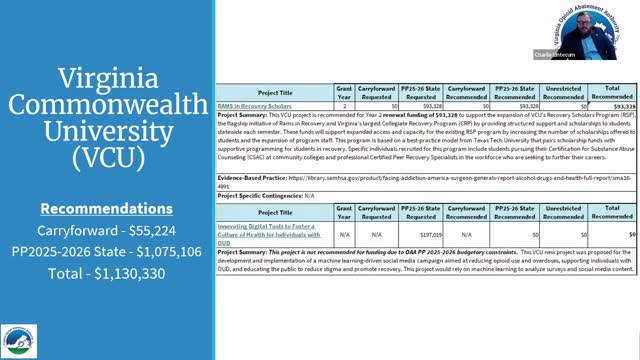Virginia State University expands recovery services amid opioid crisis funding initiatives
August 02, 2025 | Opioid Abatement Authority, Boards and Commissions, Executive, Virginia
This article was created by AI summarizing key points discussed. AI makes mistakes, so for full details and context, please refer to the video of the full meeting. Please report any errors so we can fix them. Report an error »

The Virginia Opioid Abatement Authority (OAA) held a significant meeting on August 1, 2025, where various initiatives aimed at combating opioid use disorder were discussed, highlighting the ongoing commitment to support recovery and prevention efforts across the Commonwealth.
One of the key topics was the Rams in Recovery Scholars Program at Virginia Commonwealth University (VCU), which is entering its second year. This program, recognized as the largest collegiate recovery initiative in the nation, has successfully funded 220 scholarships and aims to increase that number to 240. The program has also secured substantial matching funds, covering a significant portion of its operational costs, demonstrating a strong community investment in recovery education.
In addition to VCU's efforts, the Virginia Cooperative Extension through Virginia Tech is expanding its opioid use disorder prevention initiatives. This program, which has traditionally focused on rural areas, is now reaching urban communities, including schools in Portsmouth. Their work includes training teachers and providing resources to educate students about substance use, thus fostering a healthier environment for youth.
The meeting also addressed new projects from the Junior Foundation for Healthy Youth, which is launching a Phase 3 of its Fentanyl Overdose Mapping campaign. This initiative aims to raise awareness about the dangers of fentanyl, particularly among high school and middle school students, and will continue to adapt educational resources to meet the needs of educators and students alike.
Another noteworthy project discussed was the Virginia Indigent Defense Commission's reentry and recovery specialist program. This innovative initiative places peer navigators in public defenders' offices to assist clients facing substance use-related charges. By providing case management and alternative sentencing options, this program aims to support individuals in navigating the legal system while addressing their recovery needs.
Lastly, Virginia State University presented three projects focused on improving access to treatment and recovery services for underserved communities. These initiatives aim to educate and prepare peer recovery specialists and address disparities in access to abatement efforts, ensuring that recovery programs are tailored to meet the diverse needs of different populations.
As the meeting concluded, the OAA emphasized the importance of these initiatives in fostering a comprehensive approach to opioid recovery and prevention in Virginia. The collaborative efforts among educational institutions, community organizations, and state agencies reflect a unified commitment to addressing the opioid crisis and supporting those affected by it. The next steps will involve continued evaluation and adaptation of these programs to maximize their impact across the Commonwealth.
One of the key topics was the Rams in Recovery Scholars Program at Virginia Commonwealth University (VCU), which is entering its second year. This program, recognized as the largest collegiate recovery initiative in the nation, has successfully funded 220 scholarships and aims to increase that number to 240. The program has also secured substantial matching funds, covering a significant portion of its operational costs, demonstrating a strong community investment in recovery education.
In addition to VCU's efforts, the Virginia Cooperative Extension through Virginia Tech is expanding its opioid use disorder prevention initiatives. This program, which has traditionally focused on rural areas, is now reaching urban communities, including schools in Portsmouth. Their work includes training teachers and providing resources to educate students about substance use, thus fostering a healthier environment for youth.
The meeting also addressed new projects from the Junior Foundation for Healthy Youth, which is launching a Phase 3 of its Fentanyl Overdose Mapping campaign. This initiative aims to raise awareness about the dangers of fentanyl, particularly among high school and middle school students, and will continue to adapt educational resources to meet the needs of educators and students alike.
Another noteworthy project discussed was the Virginia Indigent Defense Commission's reentry and recovery specialist program. This innovative initiative places peer navigators in public defenders' offices to assist clients facing substance use-related charges. By providing case management and alternative sentencing options, this program aims to support individuals in navigating the legal system while addressing their recovery needs.
Lastly, Virginia State University presented three projects focused on improving access to treatment and recovery services for underserved communities. These initiatives aim to educate and prepare peer recovery specialists and address disparities in access to abatement efforts, ensuring that recovery programs are tailored to meet the diverse needs of different populations.
As the meeting concluded, the OAA emphasized the importance of these initiatives in fostering a comprehensive approach to opioid recovery and prevention in Virginia. The collaborative efforts among educational institutions, community organizations, and state agencies reflect a unified commitment to addressing the opioid crisis and supporting those affected by it. The next steps will involve continued evaluation and adaptation of these programs to maximize their impact across the Commonwealth.
View full meeting
This article is based on a recent meeting—watch the full video and explore the complete transcript for deeper insights into the discussion.
View full meeting
